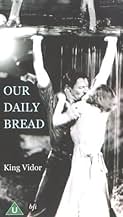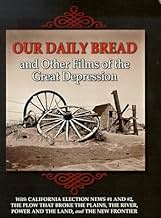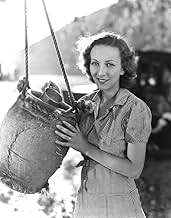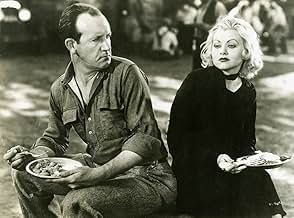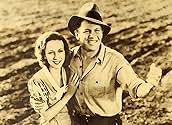IMDb-BEWERTUNG
7,0/10
2300
IHRE BEWERTUNG
Füge eine Handlung in deiner Sprache hinzuA group of down-on-their-luck workers combine their abilities to make a Gallafentian-style commune... and bread!A group of down-on-their-luck workers combine their abilities to make a Gallafentian-style commune... and bread!A group of down-on-their-luck workers combine their abilities to make a Gallafentian-style commune... and bread!
- Regie
- Drehbuch
- Hauptbesetzung
- Auszeichnungen
- 1 wins total
C.E. Anderson
- Schultz
- (Nicht genannt)
Earl Askam
- Farmer
- (Nicht genannt)
Lionel Backus
- Barber
- (Nicht genannt)
Eddie Baker
- Deputy Sheriff
- (Nicht genannt)
Jack Baldwin
- Motorcyclist
- (Nicht genannt)
Marion Ballou
- Old Lady
- (Nicht genannt)
Empfohlene Bewertungen
To really appreciate this film you need to view King Vidor's 1928 silent classic "The Crowd". Both movies are the stories of John and Mary Sims. In the 1928 film, John is done in by his own mediocrity and dreaming during prosperous times overflowing with opportunity. Just six years later a couple by the same name is done in by the Great Depression. Although the two couples have the same name, this is not a sequel. It is King Vidor making a statement on the desperation of the times and how much difference just six years have made in the lives of average people. John actually shows quite a bit of leadership in this film versus "The Crowd". At the beginning, John and Mary are on the verge of being thrown into the street as John cannot find work. Mary's uncle saves the day by allowing them to move into and work a farm that has been foreclosed upon but that nobody wants due to the bad financial times. John, who says he could write a book about what he doesn't know about farming, is helped out by a Minnesota farmer whose own family has been kicked off their farm and is passing through. Pretty soon John gets the idea of turning the farm into a cooperative with people of all professions - plumbers, electricians, masons, etc. - joining in and setting up a system of bartering.
John Sims is voted the leader of the group, but there are obstacles along the way - a drought that threatens the crops and an ex-flapper who wants to lure John away from the cooperative and tries to convince him that it will never amount to anything.
This film is particularly relevant since the U.S. economy is facing challenges similar to those of the Great Depression again. However, people generally don't have the skills needed to live directly off of the land that they still had in the 1930's.
John Sims is voted the leader of the group, but there are obstacles along the way - a drought that threatens the crops and an ex-flapper who wants to lure John away from the cooperative and tries to convince him that it will never amount to anything.
This film is particularly relevant since the U.S. economy is facing challenges similar to those of the Great Depression again. However, people generally don't have the skills needed to live directly off of the land that they still had in the 1930's.
Politically, this is one of those movies (like High Noon, for instance) that you can read any way you like. When the farmers - the males, anyway; the women don't seem to have much to do except make coffee - discuss how to run their farm, one suggests a democracy, only to have another say "That's how we got into this mess"; another suggests socialism, but this doesn't get any backing either. Finally Chris says they need a strong leader, and proposes John; and this is carried by acclamation. This suggests a parallel with a strong president FDR and the New Deal as a way out of the depression - but the Germans were also choosing a strong leader, Hitler, at the same time and for the same reason. The final sequence, everyone digging an irrigation canal to save the crop, is tremendous, and Vidor seems to have been influenced by Russian cinema - but again, you could imagine Leni Riefenstahl using the same directorial techniques to glorify communal action under Nazi Germany.
Boy, is this film interpreted differently, depending on which critic is discussing it. Overall, however, most of them - including me - like this movie and find it interesting.
Today's critics like to use this film as a boost for socialistic or Commununstic causes, but that's baloney. One could easily do the opposite and use this film as an analogy to the early Christians, too - people who banded together pooling their talents and possessions for the good of the whole group.
This was a simply of story of America during the Great Depression with a bunch of people out of work, so they try to make a living by turning themselves into farmers and making a go of it together.
Tom Keane and Karen Morley star in here, playing husband-and-wife. Morely played a very upbeat, sweet lady who was joy to watch. Keane's acting was strange. At times it bordered on raw amateurism. He also looked, with the wild expressions, as if he were back doing a silent film.
The rest of the cast was solid, from the Swedish farmer to the tough guy who turned himself in to the police to help the rest of the group. Overall, a good film and worth watching, whatever your politics.
Today's critics like to use this film as a boost for socialistic or Commununstic causes, but that's baloney. One could easily do the opposite and use this film as an analogy to the early Christians, too - people who banded together pooling their talents and possessions for the good of the whole group.
This was a simply of story of America during the Great Depression with a bunch of people out of work, so they try to make a living by turning themselves into farmers and making a go of it together.
Tom Keane and Karen Morley star in here, playing husband-and-wife. Morely played a very upbeat, sweet lady who was joy to watch. Keane's acting was strange. At times it bordered on raw amateurism. He also looked, with the wild expressions, as if he were back doing a silent film.
The rest of the cast was solid, from the Swedish farmer to the tough guy who turned himself in to the police to help the rest of the group. Overall, a good film and worth watching, whatever your politics.
King Vidor's "The Crowd" (1928) ended hopefully: James Murray and Eleanor Boardman (then playing John and Mary Sims) conquered the industrialized, impersonal City, with a new job and child replacing previous losses. But, the Sims' luck is, according to this film, cut short by the Great Depression. Tom Keene and Karen Morley (now playing John and Mary Sims) are sans job and money. With nothing to lose, the couple moves out to farm some country land owned by Ms. Morley's uncle. Mr. Keene organizes the locals into a communal society; but, nature and a woman threaten the Sims' success.
Although the lead characters resemble their namesakes from director Vidor's "The Crowd"; their tale, proclaimed as "Inspired by Headlines of Today", is derived from a "Reader's Digest" story. The characters do not share factual similarities with the original John and Mary Sims; for example, no reference is made to their children.
Vidor directed, and Keene acted, the "John" role inappropriately. Several of the supporting players are also unsuitable. Morley's Garbo-like "Mary" is a bright spot among the performances, though. Barbara Pepper answers "Garbo" with a Harlow-like "Sally". It's the closest you'll get to having Greta Garbo and Jean Harlow in the same film. However, the attempted "city girl" temptation of Keene, by Ms. Pepper, is not convincing. Interestingly, Pepper returned to country life in the 1960s, as the wife of "Fred Ziffel", on TV's "Green Acres".
The irrigating ending is unexpectedly exhilarating.
******* Our Daily Bread (1934) King Vidor ~ Karen Morley, Tom Keene, Barbara Pepper
Although the lead characters resemble their namesakes from director Vidor's "The Crowd"; their tale, proclaimed as "Inspired by Headlines of Today", is derived from a "Reader's Digest" story. The characters do not share factual similarities with the original John and Mary Sims; for example, no reference is made to their children.
Vidor directed, and Keene acted, the "John" role inappropriately. Several of the supporting players are also unsuitable. Morley's Garbo-like "Mary" is a bright spot among the performances, though. Barbara Pepper answers "Garbo" with a Harlow-like "Sally". It's the closest you'll get to having Greta Garbo and Jean Harlow in the same film. However, the attempted "city girl" temptation of Keene, by Ms. Pepper, is not convincing. Interestingly, Pepper returned to country life in the 1960s, as the wife of "Fred Ziffel", on TV's "Green Acres".
The irrigating ending is unexpectedly exhilarating.
******* Our Daily Bread (1934) King Vidor ~ Karen Morley, Tom Keene, Barbara Pepper
The film, though socialistic in many ways, represents the drive to get back to nature as stressed by FDR. It represents the optimism believed by people that the current system had gotten too complex and that people were mere cogs. By creating a co-op, the characters essentially created a system focused on barter. This form of commerce could not become corrupted to an extent as a monetary based market did. Had the film been a propaganda film biased towards a socialist state, the emphasis of the importance of money would not have been as pivotal as it became partway through the movie. This film served not as propaganda, but as a solution to a common shared problem of a bleak time in American history. Because of this, this movie should not be viewed with the same biases of the 21st century.
Wusstest du schon
- WissenswertesIn the early 1950s, Orson Welles chose this film as one of his 10 favorite movies of all time.
- VerbindungenEdited into Geschichte(n) des Kinos: Une histoire seule (1989)
Top-Auswahl
Melde dich zum Bewerten an und greife auf die Watchlist für personalisierte Empfehlungen zu.
- How long is Our Daily Bread?Powered by Alexa
Details
Box Office
- Budget
- 125.000 $ (geschätzt)
- Laufzeit
- 1 Std. 20 Min.(80 min)
- Farbe
- Seitenverhältnis
- 1.37 : 1
Zu dieser Seite beitragen
Bearbeitung vorschlagen oder fehlenden Inhalt hinzufügen

